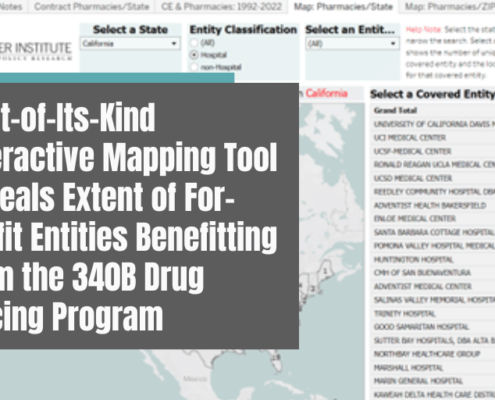New Report & Legal Analysis Suggests ICER’s Quality Adjusted Life Years Methodology Violates the Americans with Disabilities Act
Pioneer Institute Finds that Adoption of QALY Methodology Threatens to Discriminate Against Disabled Individuals on Medicaid on Numerous Grounds
Media inquiries: Contact Micaela Dawson, 617-723-2277 ext. 203 or mdawson@pioneerinstitute.org
BOSTON – Today, Pioneer Institute released a new report, The Legality of QALY under the ADA, which outlines several potential legal violations and negative implications for disabled individuals related to the adoption of the quality adjusted life years (QALY) approach to drug value assessment, used most prominently by the Institute for Clinical and Economic Review (ICER). Authored by Pioneer Institute Senior Legal Fellow, Jim McKenna, and Visiting Fellow in Life Sciences, Dr. William Smith, the report concludes that, if adopted by state Medicaid programs to determine medical treatment value and access, QALY would violate the ADA on at least two separate, but related grounds, including:
1) By decreasing the availability of effective treatments for people living with a disability; and
2) By increasing the risk of institutionalization of certain people living with a mental disability
As states explore solutions to control the cost of care for consumers, some policymakers are considering the adoption of ICER-style cost-effectiveness reviews in state Medicaid programs to determine access to and reimbursements for certain medical treatments. Pioneer Institute’s report illustrates how the use of QALY could discriminate against patients with chronic or complex conditions and Americans with a disability, and limit access to innovative and life-saving treatments for these individuals. The report explains:
“QALY has the potential to unlawfully discriminate against disabled or chronically ill persons who may never experience full restoration to a certain quality of life defined by QALY. Consequently, the QALY methodology may cause Medicaid programs to have a disparate impact, or discriminatory effect, on disabled persons. Disparate impact could stem from QALY assigning lower values to treatments for disabilities; thus, rendering them less available to those whom they benefit.” (Pg. 8)
Pioneer Institute’s report also suggests that Americans with a mental disability could be unlawfully discriminated against by the adoption of the QALY methodology in state Medicaid systems. Notably, QALY could put people with a mental disability at a higher risk of being institutionalized, which is prohibited by the ADA through the integration mandate:
“In particular, QALY’s assignment of lower values for treatments of mental conditions may deny mentally ill persons Medicaid coverage and thereby render effective treatments unaffordable to them. As a result, their conditions may worsen, requiring them to reside in a specialized mental institution or otherwise be isolated from the community… A public program or service that causes mentally disabled persons to receive care in a segregated institutionalized setting, while allowing the physically disabled to receive services in a community setting, is itself a violation of the ADA.” (Pg. 12-13)
Given these two potential violations of the ADA, Pioneer Institute’s report predicts that a legal challenge to any adoption of ICER’s QALY methodology by state Medicaid systems on ADA grounds seems almost certain.
Read a one-page fact sheet on this topic.
###
About the Authors
Jim McKenna is Senior Legal Fellow at Pioneer Institute. He has been an Adjunct Teaching Professor at Worcester Polytechnic Institute for more than 25 years, where he teaches courses on law and ethics. Those courses have included Business Law, Ethics and Social Responsibility, Environmental Law and Ethics, International Environmental Law and Constitutional Law: The Foundation of Government – as well as an independent study on The Ethics of Managing Artificial Intelligence. After serving as a prosecutor for a decade, which included years of service in the Organized Crime Division of the Suffolk County (Boston) District Attorney’s Office, McKenna has been in private practice for more than two decades. McKenna lives in Millbury, Massachusetts, where he serves as Town Moderator. He is a graduate of the College of the Holy Cross and Boston College Law School.
William S. Smith is Visiting Fellow in Life Sciences at Pioneer Institute. He has 25 years of experience in government and in corporate roles, including as vice president of public affairs and policy at Pfizer, and as a consultant to major pharmaceutical, biotechnology and medical device companies. He held senior staff positions for the Republican House leadership on Capitol Hill, the White House, and in the Massachusetts Governor’s office. He is affiliated as research fellow and managing director with the Center for the Study of Statesmanship at The Catholic University of America (CUA), where he earned his PhD.
About Pioneer Institute
Pioneer Institute is an independent, non-partisan, privately funded research organization that seeks to improve the quality of life in Massachusetts through civic discourse and intellectually rigorous, data-driven public policy solutions based on free market principles, individual liberty and responsibility, and the ideal of effective, limited and accountable government.
Get Updates On Our Life Sciences Work!
Related Posts
Video
[ytp_video source=”mCjkRYr9kC0″]
Learn more here.









